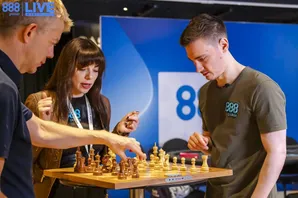After completing his ambitious $1,000 10NL Challenge in poker, which took him three years, Nick Eastwood has been reflecting on what’s next in his gaming journey. He’s expressed that while poker has pushed him to new limits, it doesn’t fully satisfy his competitive nature. Eastwood has realized that there are aspects of poker that feel incomplete due to the game’s inherent unpredictability and variance, especially for players not at the top level.
The Parallels Between Poker and Chess
Recently, Eastwood reconnected with a long-lost passion: chess. Having played it as a kid, he rediscovered the game while at the 888LIVE event in Barcelona, where he got to interact with chess players and content creators. Although many have drawn parallels between poker and chess—both being mentally intense games with strategic elements—Eastwood doesn’t quite agree with the common narrative.
While it’s true that both games require cognitive skills, he argues that these similarities are often exaggerated. In particular, he believes that the crossover between the games is not as meaningful as it’s made out to be.
Why Chess Players Are Drawn to Poker
Eastwood suggests that the real reason chess players are intrigued by poker lies in the difference in how the games operate. In poker, the element of luck and incomplete information plays a significant role. A player can be highly skilled, but still lose to a lesser player due to the variance in the game. Most poker players spend much of their time losing, and often, it’s hard to tell if the loss was due to their own fault or just bad luck.
On the other hand, chess is more straightforward. The best player almost always wins, and it’s easier to measure improvement. Losing in chess is often entirely your fault, which can be brutal, but also an opportunity for growth and learning. Eastwood believes that for chess players, poker offers a refreshing break from the constant grind of striving to always be the best, with the added benefit that luck can sometimes level the playing field.
The Catharsis of Losing in Chess
For Eastwood, picking up chess again has been cathartic. After a decade of navigating poker’s ups and downs, where sometimes it feels like no matter how well he plays, the outcome can still be a loss, chess offers a simpler form of feedback. When he loses in chess, it’s clear that it’s because of his own lack of skill. This brutal honesty about his own weaknesses is refreshing.
Though Eastwood admits that his chess skills are still relatively poor (with a rating of 500), he has already noticed his improvement. He appreciates being able to directly analyze his mistakes, and even spent some of his poker winnings on his first-ever chess board.
Conclusion: Two Beautifully Different Games
Eastwood concludes that while both chess and poker are incredible games, they are vastly different in how they challenge the player. Chess demands pure skill and offers clarity on why a player wins or loses, while poker blends strategy with luck, making the outcomes less predictable. For him, both games provide a necessary balance in his life, each in its own unique way.
As for his chess journey, Eastwood humorously ends by preparing to “blunder his queen,” showing that, even as he learns, he remains connected to the fun and personal growth that both games offer.











